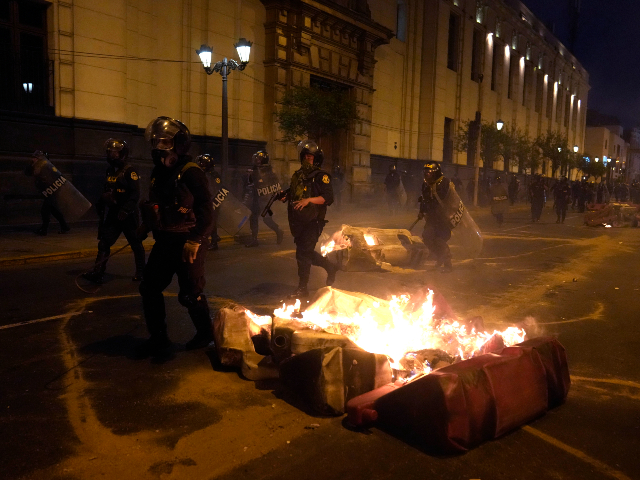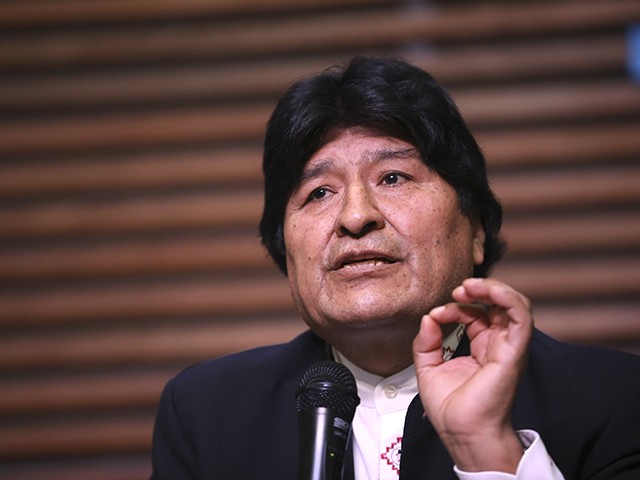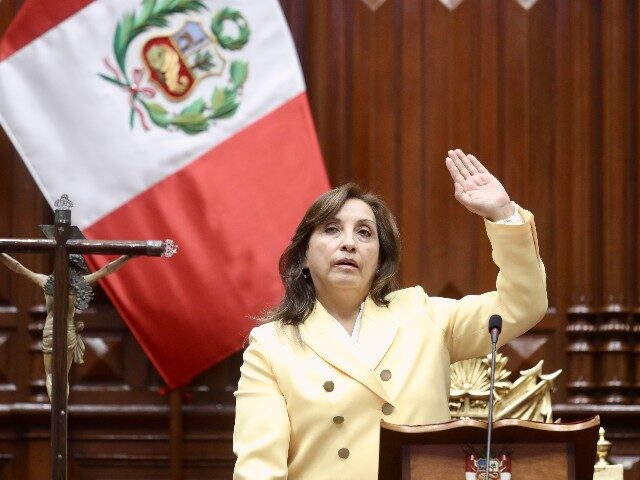Peru’s top prosecutor’s office announced Tuesday it would launch a “genocide” and “homicide” inquiry against leftist President Dina Boluarte, her Prime Minister Alberto Otárola, and other members of her cabinet.
The investigation stems from government actions in response to a wave of deadly left-wing violence in the country in response to the ouster and arrest of communist former President Pedro Castillo, who attempted to stage a coup d’etat to prevent his impeachment last year. Boluarte served as Castillo’s vice president.
The riots demanding Castillo’s return to power have so far left 47 reported deaths and have resulted in the Peruvian economy losing an estimated 1.2 billion Peruvian sols ($315.1 million USD).
“The preliminary investigation is for the alleged crimes of genocide, qualified homicide and serious injuries, committed during the demonstrations in the months of December 2022 and January 2023 in the regions of Apurímac, La Libertad, Puno, Junín, Arequipa and Ayacucho,” Peru’s Public Prosecution office said in an announcement posted to Twitter on Tuesday evening.
La investigación preliminar es por los presuntos delitos de genocidio, homicidio calificado y lesiones graves, cometidos durante las manifestaciones en los meses de diciembre de 2022 y enero de 2023 en las regiones de Apurímac, La Libertad, Puno, Junín, Arequipa y Ayacucho.
— Ministerio Público (@FiscaliaPeru) January 10, 2023
The announcement from the prosecutor’s office comes after Peru experienced its deadliest day of rioting, in which 18 people died and 73 were wounded in the city of Juliaca, Puno, on Monday. One police officer and one child were among the dead. Rioters burned the officer, identified as José Luis Soncco Quispe, alive inside his police vehicle.
The “genocide” investigation against Boluarte is a result of the rioters accusing the police of violence against them.
The events that took place on the city of Juliaca on Monday prompted Peru’s government to impose a three-day overnight curfew in the region.
Peru’s recent convoluted political situation — which has so far resulted in a total of six presidents over the past six years — started a new chapter after the arrest and impeachment of Castillo in December.

Riot police run during clashes with supporters of ousted President Pedro Castillo in front of Congress in Lima, Peru, Sunday, Dec. 11, 2022. (AP Photo/Martin Mejia)
Castillo, who was narrowly elected in 2021 in a controversial election, had sought to stay in power via a failed autogolpe (“self-coup”), attempting to dissolve the nation’s Congress right before it was scheduled to carry out an impeachment vote against him. Dissolving Congress would have prevented his impeachment. Instead, police arrested him for unconstitutional acts and Congress formally stripped him of the presidency.
Castillo is currently serving 18 months in preventive prison and is accused of “rebellion” and conspiracy to abuse authority, potentially facing between ten to 20 years in prison if found guilty.
Dina Boluarte, who served as Castillo’s vice president, was sworn in as Peru’s new president following Castillo’s arrest.
The arrest of Castillo immediately sparked an ongoing deadly wave of riots that demand his liberation across several of the country’s regions — with the Southern region of Puno being one of the most heavily affected.
The protesters are backed by sympathizers of the former Marxist president as well as allies in the region, including other regional governments. Peru’s authorities have denounced the presence of foreign leftists who allegedly entered Peru to incite the rioters and to promote separatism in Puno. A group of Peruvian lawmakers formally accused former far-left Bolivian President Evo Morales of promoting the protests with the intention of annexing Puno to Bolivia.

Bolivia’s former President Evo Morales gives a press conference regarding the rejection of his plan to run for Senator in Buenos Aires, where he is living, in Argentina, Friday, Feb. 21, 2020. (AP Photo/Natacha Pisarenko)
On Tuesday, the Peruvian Congress granted a vote of confidence to Prime Minister Alberto Otárola and his cabinet of ministers as part of a mandatory process established by the nation’s constitution after 30 days have passed since a new government was sworn in. Failure to receive a vote of confidence would had instantly forced the Peruvian government to put together a new cabinet.
During the event, Otárola responded to the criticism of some of the legislators regarding the alleged excessive use of force against the leftist rioters.
“We are sure that the investigations that have to be carried out will respect due process and the right to defense of the troops,” Otárola said, while asserting that his responsibility is to “achieve peace and tranquility for [Peru’s] 33 million inhabitants.”
As of Wednesday, the rioters continue to block roads. Authorities have documented over 300 injured police officers since the start of the protests in December. On Tuesday evening, a group of around 300 protesters from the Chamaca district overwhelmed a bus that transported police officers, forcing the officers to evacuate the vehicle before the protesters set it on fire.
The Organization of American States’s Inter-American Commission on Human Rights (IACHR) announced on Monday that it would send a delegation to Peru between January 11-13 to observe the human rights situation in the South American nation as a result of the ongoing wave of violent leftist riots. President Dina Boularte met with the IACHR delegation on Wednesday morning.
#CIDH inicia visita de observación a #Perú en el contexto actual. Del 11 al 13 de enero, la delegación liderada por el VicePdte. @StuardoRalon junto a Com. @JoelHernandezG se reunirá con autoridades, con víctimas y familiares, y varios sectores en Lima, Ica y Arequipa #CIDHEnPerú pic.twitter.com/h5nutrJyz2
— CIDH – IACHR (@CIDH) January 11, 2023
Chilean far-left President Gabriel Boric — who rose to prominence during the leftist riots that took place in Chile in 2019 and then had to plead with the nation’s left to stop rioting now that he is president — expressed his support of the IACHR’s delegation while condemning the actions of Peru’s police through his Twitter account on Tuesday afternoon.
“It is unacceptable and painful to see the number of people who have died in clashes with the police in southern Peru. The State must always protect and respect human rights,” Boric wrote on Twitter. “Our support to the IACHR that will visit the country to see the serious situation.”
Es inaceptable y doloroso ver la cantidad de personas que han muerto en enfrentamientos con la policía en el sur del Perú.
El Estado debe siempre resguardar y respetar los DD.HH.
Nuestro apoyo a la @CIDH que visitará el país para ver la grave situación.— Gabriel Boric Font (@GabrielBoric) January 10, 2023
Christian K. Caruzo is a Venezuelan writer and documents life under socialism. You can follow him on Twitter here.

COMMENTS
Please let us know if you're having issues with commenting.